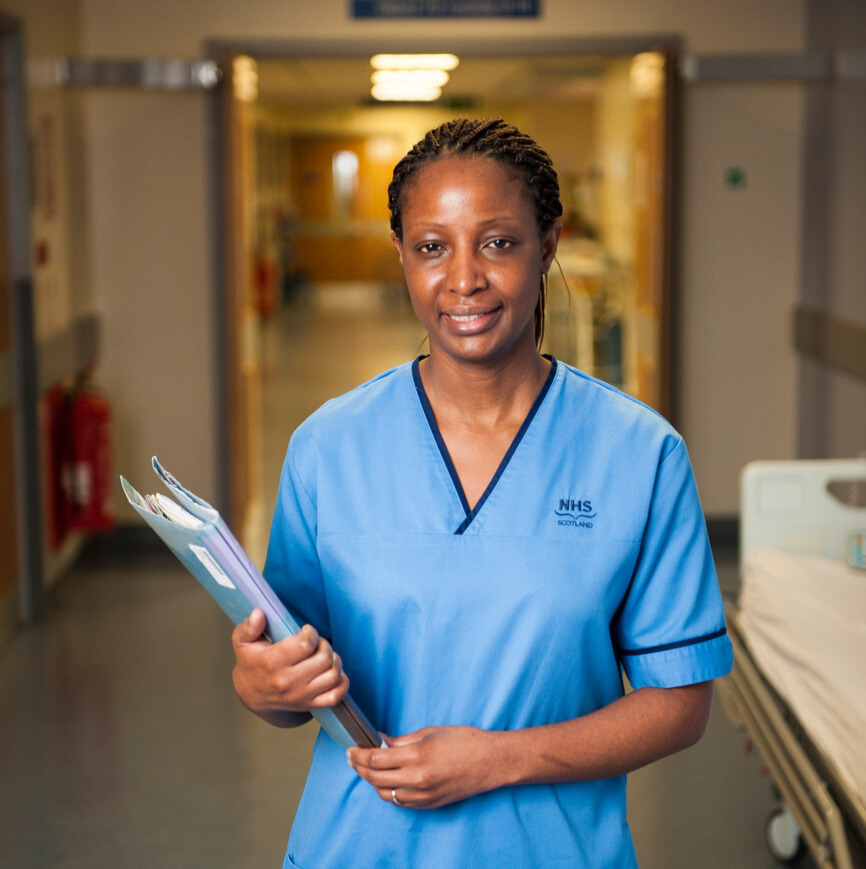Previous
Adult nurse
To become a children’s nurse in the NHS, you'll need to complete a pre-registration degree programme accredited by the Nursing and Midwifery Council (NMC).
Children's nurses work in partnership with children, young people, and their families in various health and care settings. They support the physical, mental, and emotional health and wellbeing of children and young people under their care. This involves assessing their needs, planning care, delivering treatment, and monitoring their health.

To access a course that could lead to a career in children's nursing, useful subjects include:
Speak to your guidance teacher or careers adviser about subjects offered at your school.

You may find it helpful to get some healthcare experience by doing a work placement or volunteering. You will get training, increase your knowledge, and learn new skills. This could help you when applying to college, university, or a new job with NHSScotland. Contact your local health board to find out about the work placements or volunteering opportunities available to you.
There are many different pathways to becoming a registered children's nurse. Find out the best way for you below.
If you have the required qualifications, you can apply for a nursing degree, regardless of age. You could be a school pupil, college student, career changer, or a nursing assistant practitioner.
This pathway involves gaining a nursing degree from an NMC-accredited university. Degree programmes take 3 years full-time. When you graduate, you'll become a qualified nurse eligible to register with the NMC. You can then apply for children's nursing roles in the NHS.
There are 4 universities in Scotland that offer undergraduate programmes in children’s nursing, approved by the NMC:
Search for pre-registration undergraduate nursing degree programmes on My World of Work.
SWAP is for adult learners who have been out of education for 3 years or more.
The SWAP pathway offers a supportive route that you can take to re-enter education and pursue a career in nursing. The one-year course will help to bridge gaps in your education.
Completing this pathway will prepare you for entry into a SWAP partnered university undergraduate nursing degree programme. Tuition fees and a bursary may be available.
You can apply for an HNC in healthcare Practice if you are an existing healthcare support worker or you do not have the necessary qualifications for direct entry into an undergraduate nursing degree programme.
This pathway is a stepping stone towards a nursing degree.
Successful completion of the HNC programme may allow direct entry into the second year of an undergraduate nursing degree programme. It can help accelerate your progress towards becoming a registered nurse in NHSScotland.
Taking one year to complete, many colleges in Scotland provide the HNC Healthcare Practice qualification:
Search for college courses on My World of Work.
The Open University offers options to support the career development of nursing support workers.
If you're a nursing support worker, the CertHE in Healthcare Practice at SCQF level 7 will help you develop your knowledge and understanding and learn the practical and professional skills to:
This nationally recognised qualification includes online study and supervised practice in your workplace.
Find out more about the CertHE in Healthcare Practice with the Open University.
The Open University offers a 4-year part-time undergraduate children's nursing degree programme at SCQF level 10. You'll combine working in your existing nursing support worker or assistant practitioner role with online study. The distance learning approach includes local placements to provide hands-on experience and training.
The Scottish Government covers all tuition fees.
Find out more about Open University nursing degrees.
To be eligible for the postgraduate pathway, you'll need an undergraduate degree in any subject. The course takes 3 years to complete.
During this full-time course, you'll split your time between on-campus learning and practice placements in hospitals and community settings.
In Scotland, the University of Dundee offers the following pre-registration postgraduate programmes:
Both programmes are approved by the NMC.
Search for pre-registration postgraduate nursing degree programmes on My World of Work.
If you were previously registered with the Nursing and Midwifery Council (NMC), the return to practice pathway is right for you. You’ll need an NMC statement of entry confirming your previous registration.
You'll also need to meet the NMC's practice hours requirements before you start your readmission application.
If you're unable to meet the practice hours requirement, you can complete one of the following to update your knowledge and skills:
The Paramedic, Nursing and Midwifery Student Bursary (PNMSB) scheme is managed by the Student Awards Agency Scotland (SAAS) on behalf of the Scottish Government.
It includes a non-repayable bursary of £10,000 that’s not income assessed.
You must meet the eligibility criteria:
Other bursaries or grants may be available depending on your circumstances.
Find out more about SASS funding for nursing and midwifery students.
Caring for children and young people is different from adult nursing.
You must be knowledgeable about the developmental stages of their health and wellbeing. You'll adapt your communication skills to suit the young person’s age. You'll also learn to interpret children's behaviours and reactions to recognise changes in their health and development and provide appropriate support.
Building close relationships with young people and their families is an essential and rewarding aspect of the role.
Being a children's nurse gives you the opportunity to make a real positive difference in the lives of young people and their families.
As a children's nurse you are a highly skilled professional who has responsibility for the decisions you make within your role.
Your main tasks could include:
As well as being caring, empathetic and compassionate, you'll need the following skills:
Children’s nurses usually work in a team with other health and social care professionals, including:
As a children’s nurse, you could work in:
Children’s nurses also work in the care sector, independent healthcare sector and in education.
When you become qualified, you must register with the Nursing and Midwifery Council (NMC) to practise as a children's nurse. The NMC are the independent regulator for all registered nurses and midwives in the UK.
This video from the NMC explains what makes you a registered professional.
Once registered as a children’s nurse, there are ongoing requirements for education and skills development. You’ll have opportunities to further develop in your career. You could develop your skills in:
In your first year as a newly qualified nurse, you’ll get extra support and guidance through the Flying Start NHS programme.
In the NHS, you may choose to be a staff nurse throughout your nursing career, keeping up to date through continuing professional development. Taking extra courses and workplace learning could lead to progression through the career pathway to senior, advanced, or consultant level.
When you’ve qualified as a registered children’s nurse, there are lots of specialisms to choose from, including:
There are also opportunities to move into management or health education roles, such as:
Revalidation is a process that all nurses need to follow to maintain their registration with the NMC every 3 years.
It is an ongoing process throughout your career as a nurse and aims to:
When you become a qualified children’s nurse, you must register with the Nursing and Midwifery Council (NMC) to work in the NHS. You can also join the Royal College of Nursing.

Discover the skills and qualifications you’ll need for each role and what the work will be like.
Explore careers
We'll guide you through the recruitment process, from applying online to interview preparation.
Help with recruitment